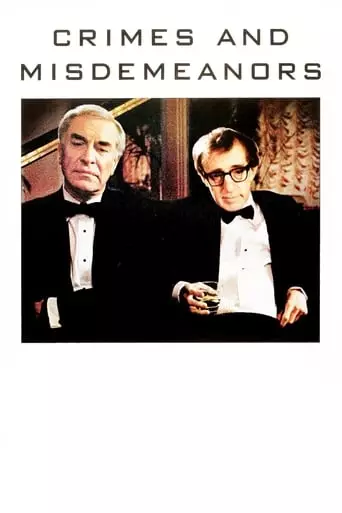
Crimes and Misdemeanors (1989) Watch Online Free
An ophthalmologist’s mistress threatens to reveal their affair to his wife, while a married documentary filmmaker is infatuated by another woman.
Crimes and Misdemeanors (1989), directed by Woody Allen, is a film that intricately examines moral dilemmas, human nature, and the impact of choices on personal lives. The movie intertwines two narratives: one focused on Judah Rosenthal, a wealthy ophthalmologist who has an affair with his lover Dolores and decides to have her killed when she threatens to reveal their relationship, and another featuring Cliff Stern, a struggling documentary filmmaker, who faces personal and professional challenges. The two stories intersect thematically, exploring issues of guilt, morality, faith, and the human quest for meaning in a seemingly indifferent universe.
The film delves into complex ethical questions, particularly through Judah’s storyline. He is a man who, after committing murder, struggles with his conscience but ultimately faces no consequences. This raises profound questions about justice, fate, and the randomness of life. Judah’s experience mirrors themes found in Fyodor Dostoevsky’s Crime and Punishment, where the protagonist also wrestles with moral guilt after committing murder, yet the outcome for Judah contrasts sharply, as he escapes without punishment, which adds a layer of philosophical ambiguity.
In parallel, Cliff’s narrative offers a more existential exploration, though lighter in tone. As an aspiring filmmaker, Cliff struggles with his admiration for his brother-in-law’s superficial success and faces moral questions related to professional ethics and personal integrity. The two narratives, though seemingly unrelated, explore the same overarching themes of personal responsibility, guilt, and the often indifferent nature of life itself.
The film’s central question—whether a person can live with the knowledge of their wrongdoing—offers a stark contrast between Judah’s cold, calculating justification of murder and Cliff’s more humane, albeit flawed, attempt at making ethical choices. As Judah contemplates his actions, he is left with a sense of hollow justification, whereas Cliff’s storyline brings attention to the consequences of his decisions and his struggle for personal meaning.
The film’s exploration of moral ambiguity and its portrayal of characters who evade the consequences of their actions may leave viewers questioning the fairness of life and the existence of a higher moral order. Critics have noted that Crimes and Misdemeanors is a film where right and wrong are not clearly delineated. The pessimism expressed in the final resolution—where Judah escapes punishment for his actions—challenges the audience’s sense of justice, a theme that resonates with Allen’s previous works and can be seen as a precursor to his later films like Match Point and Irrational Man
The philosophical underpinnings of the film are profound. The narrative is rooted in existentialism, with characters grappling with their sense of self and purpose in a chaotic world. Judah’s visit to his childhood home, where he contemplates his past and the teachings of his family, symbolizes his internal conflict. This scene highlights the tension between his desires for power and his lingering moral conscience, illustrating the film’s engagement with themes of faith, guilt, and redemption
After watching Crimes and Misdemeanors, you may feel a mix of contemplation and unease. The film’s unsettling portrayal of a world where evil often goes unpunished and good deeds go unnoticed may leave you questioning the nature of justice and the meaning of life. The unresolved moral conflicts in the film make it difficult to walk away with clear answers, and viewers might find themselves reflecting on their own ethical choices and the consequences of their actions. While some may find the film’s pessimistic tone heavy, others will appreciate its intellectual richness and its ability to provoke deep philosophical thought
